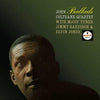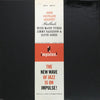



John Coltrane - Ballads (non scellé)
Rarity - Unsealed (mint conditions)
John Coltrane – tenor saxophone [click here to see more vinyl featuring John Coltrane]
McCoy Tyner – piano [click here to see more vinyl featuring McCoy Tyner]
Jimmy Garrison (A1-B2, B4), Reggie Workman (B3) – bass
Elvin Jones – drums [click here to see more vinyl featuring Elvin Jones]
Written by Frank Loesser (A1), Don Raye (A2), Jimmy McHugh (A3), Harold Adamson (A3), Arthur Altman (A4), Jack Lawrence (A4), Johnny Burke (B6), Mack Gordon (B5), Harry Warren (B5), Richard Rodgers (B7), Lorenz Hart (B7), Jimmy Van Hausen (B8)
1 LP, gatefold jacket
Original analog Master tape : YES
Heavy Press : 180g
Record color : black
Speed : 33RPM
Size : 12”
Stereo
Studio
Record Press : Pallas
Label : Speakers Corner
Original Label : Impulse
Recorded December 21, 1961; September 18 and November 13, 1962 at Van Gelder Studio, Englewood Cliffs
Engineered by Rudy Van Gelder
Produced by Bob Thiele
Originally released in 1963
Reissued in 2003
Tracks:
Side A :
- Say It (Over and over Again)
- You Don't Know What Love Is
- Too Young to Go Steady
- All or Nothing at All
Side B :
- I Wish I Knew
- What's New?
- It's Easy to Remember
- Nancy (With the Laughing Face)
Reviews :
"Throughout John Coltrane's discography there are a handful of decisive and controversial albums that split his listening camp into factions. Generally, these occur in his later-period works such as Om and Ascension, which push into some pretty heady blowing. As a contrast, Ballads is often criticized as too easy and as too much of a compromise between Coltrane and Impulse! (the two had just entered into the first year of label representation). Seen as an answer to critics who found his work complicated with too many notes and too thin a concept, Ballads has even been accused of being a record that Coltrane didn't want to make. These conspiracy theories (and there are more) really just get in the way of enjoying a perfectly fine album of Coltrane doing what he always did -- exploring new avenues and modes in an inexhaustible search for personal and artistic enlightenment. With Ballads he looks into the warmer side of things, a path he would take with both Johnny Hartman (on John Coltrane & Johnny Hartman) and with Duke Ellington (on Duke Ellington and John Coltrane). Here he lays out for McCoy Tyner mostly, and the results positively shimmer at times. He's not aggressive, and he's not outwardly. Instead he's introspective and at times even predictable, but that is precisely Ballads' draw." AllMusic Review by Sam Samuelson
Ratings :
AllMusic : 4 / 5 , Discogs : 4.83 / 5



